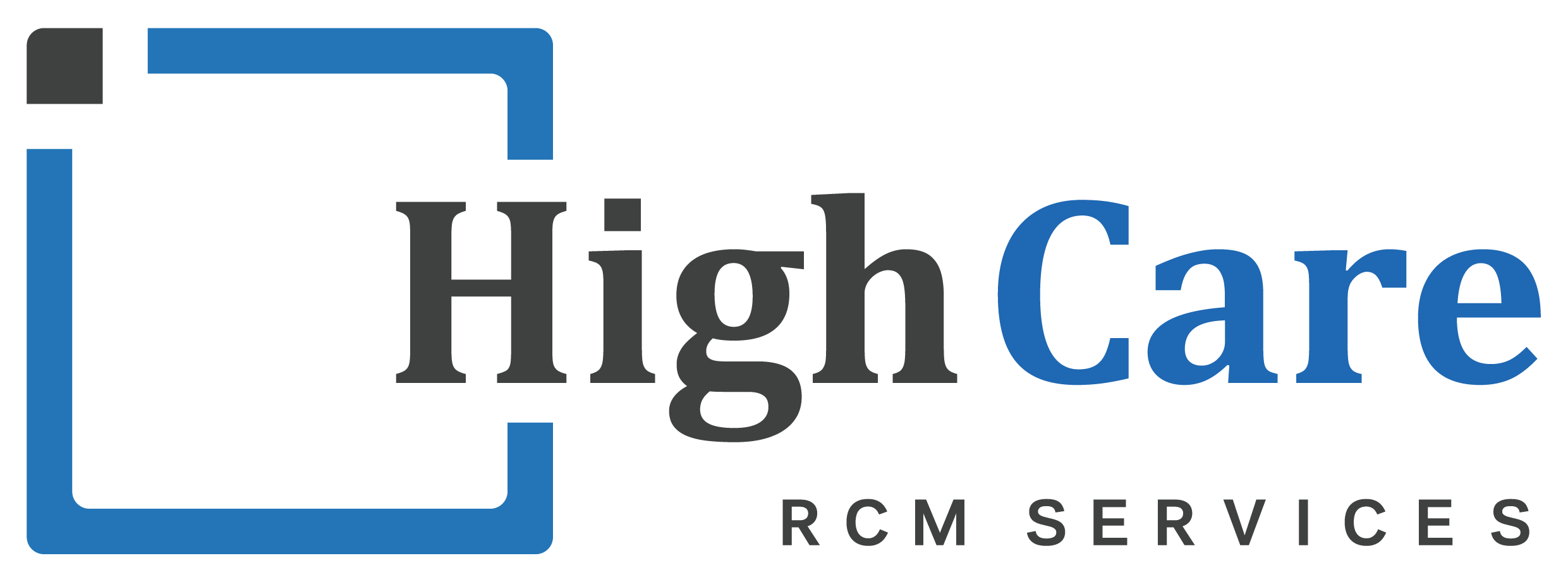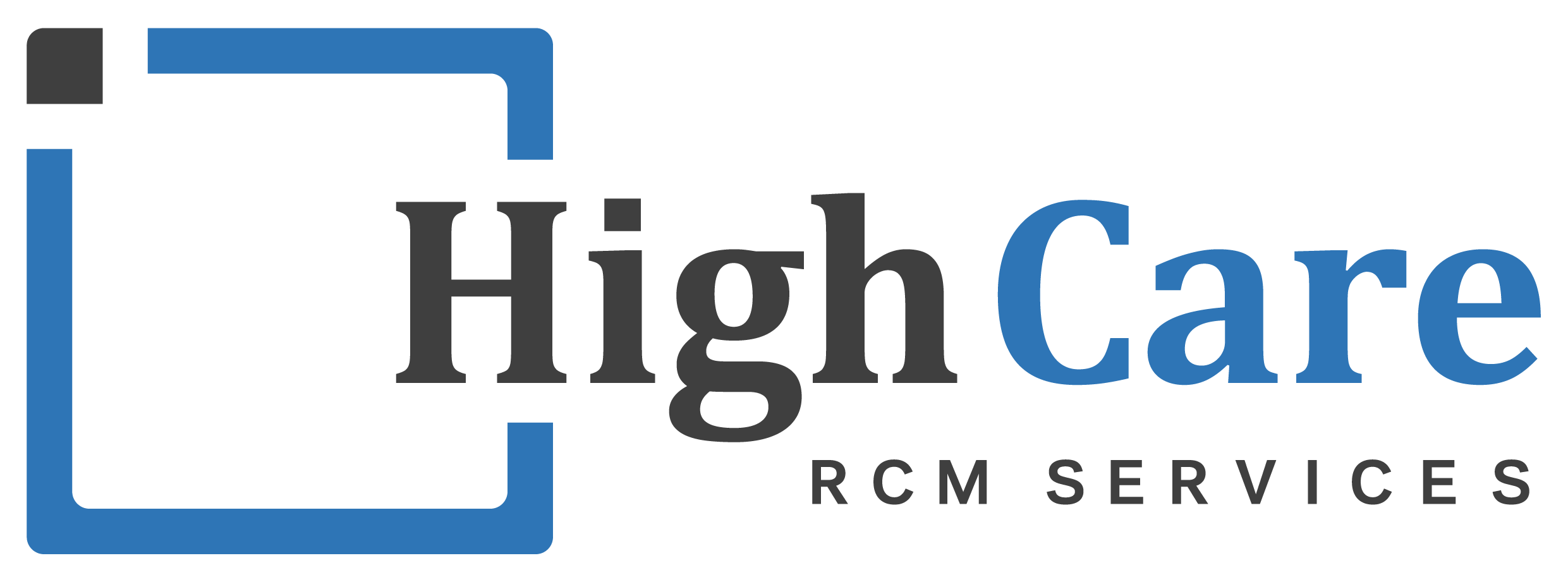- 14, Kathiresan Street, Pallipalayam corner, Kumarapalayam – 638183
Realizing the Value of Outsourcing Healthcare RCM: Why It Matters
High Care RCM
In today’s rapidly evolving healthcare industry, healthcare providers face numerous challenges in maintaining a delicate balance between delivering quality patient care and managing financial aspects effectively. In this blog, we delve into the fundamental concepts of healthcare RCM and explore the challenges faced by decision-makers when contemplating outsourcing RCM services. By considering the compelling benefits of outsourcing, including enhanced quality, timely processing, and full compliance, healthcare organizations can reduce costs, maximize revenue, and ultimately elevate patient care.
Understanding Healthcare Revenue Cycle Management (RCM)
Healthcare RCM encompasses the entire process of managing financial transactions related to patient care, from registration and scheduling to medical coding and billing, claims submission, denial management and follow-up. It plays a crucial role in the financial well-being of healthcare institutions, affecting cash flow, profitability, and overall efficiency. The complexity of the RCM process demands meticulous attention to detail, adherence to constantly changing regulations, and proficiency in medical coding and billing.

The Challenges Faced by Healthcare Organizations in In-house RCM
Managing RCM in-house can present several challenges for healthcare providers and payers. These challenges include:
- Resource Constraints. Dedicated personnel, training, and advanced technology are necessary to handle the complexities of RCM effectively. Building and maintaining an in-house RCM team requires significant financial investments and continuous training to keep up with evolving industry practices.
- Constant Regulatory Changes. The ever-changing healthcare regulations require continuous adaptation, adding to the administrative burden. Staying compliant with these regulations is critical to avoid penalties and reputational damage.
- Rising Costs. In-house RCM operations can be costly due to technology investments, staff salaries, and ongoing training expenses. These costs can be particularly burdensome for smaller healthcare organizations.
- Time-Consuming Processes. Lengthy billing cycles and delayed reimbursements can hinder financial stability and impede timely patient care. Inefficient RCM processes may lead to cash flow disruptions and negatively impact the overall financial health of the organization.
Benefits of Outsourcing Healthcare RCM Services
1. Streamlined Operations and Cost Reduction
Outsourcing RCM services to Revenue Cycle services expert allows healthcare organizations to leverage industry expertise without incurring substantial overhead costs. By eliminating the need for in-house resources and technology investments, organizations can optimize their financial efficiency. Additionally, outsourcing offers a predictable pricing model, making it easier to plan and manage budgets.
2. Improved Revenue Cycle and Timely Payments
With a dedicated RCM partner, healthcare providers can experience a streamlined revenue cycle. Expert billers and coders ensure accurate claims submission, reducing denial rates and improving the overall efficiency of the payment process. This results in faster reimbursements, positively impacting cash flow and financial stability.
3. Compliance and Security
Outsourcing to a reputable RCM service provider ensures full compliance with changing regulations and industry standards. These specialized partners have an in-depth understanding of healthcare compliance requirements and maintain strict data security measures to protect sensitive patient information. This reduces the risk of data breaches and potential regulatory penalties.
4. Access to Advanced Technology
Highly specialized RCM companies invest in cutting-edge technology to maximize efficiency and accuracy. Partnering with such experts grants access to the latest tools without the need for the healthcare organization to make costly purchases themselves. This technology enables faster claims processing, improved billing accuracy, and enhanced analytics for better financial insights.
5. Focus on Core Competencies
By outsourcing non-core functions like RCM, healthcare providers and payers can shift their focus to core competencies—delivering exceptional patient care and enhancing service quality. With the administrative burden of RCM off their shoulders, decision-makers can allocate more time and resources to improving healthcare outcomes and patient experiences.
6. Scalability and Flexibility
Outsourcing allows healthcare organizations to adapt quickly to fluctuations in patient volume, ensuring that RCM operations remain efficient and responsive. During periods of increased patient flow, the RCM service provider can scale up resources to maintain timely processing and optimize revenue collection.
Elevating Patient Care through Outsourcing
By outsourcing RCM services to a seasoned Healthcare outsourcing company, healthcare organizations can redirect valuable time and resources towards patient-centric activities. The enhanced financial stability achieved through efficient RCM positively impacts patient care and the overall healthcare experience.
Improved Staff-Patient Interaction
With reduced administrative burdens, healthcare staff can devote more time to direct patient care and build stronger patient-provider relationships. Enhanced interactions foster a patient-centered culture, ultimately leading to higher patient satisfaction.
Investments in Healthcare Technology
Outsourcing RCM allows healthcare organizations to allocate resources to technology and innovations that directly impact patient care. For instance, funds saved from RCM costs can be invested in state-of-the-art medical equipment or advanced telemedicine solutions, further enhancing patient care delivery.
Best Practices for Revenue Cycle Outsourcing
In the realm of revenue cycle outsourcing, adopting best practices is vital for seamless operations. Embrace these strategies to ensure optimal performance and a healthy partnership with your outsourcing provider. The practices include:
- Effective Communication: Maintain open lines of communication with the outsourcing partner to stay informed about the revenue cycle’s progress, potential issues, and resolutions. Regular meetings and reports aid in understanding performance and addressing concerns promptly.
- Data Analytics: Leveraging the analytical capabilities of the outsourcing partner can provide valuable insights into revenue cycle performance. Analyze key performance indicators (KPIs) to identify areas for improvement and increased efficiency.
- Regular Auditing: Conduct periodic audits of revenue cycle processes to ensure compliance, accuracy, and adherence to industry regulations. Audits also help in identifying any potential areas of risk or non-compliance.
- Continual Improvement: Work collaboratively with the outsourcing partner to implement continuous improvement strategies. Stay informed about industry trends, new regulations, and emerging technologies to remain ahead of the curve.
In the dynamic healthcare landscape, outsourcing healthcare RCM services has emerged as a strategic imperative for healthcare providers and payers alike. High Care RCM Services offers comprehensive solutions that reduce costs, maximize revenue, and elevate patient care. By entrusting your RCM needs to a specialized partner, you can focus on delivering exceptional healthcare services while ensuring financial stability and regulatory compliance.
Reach out to High Care RCM Services today and unlock the true potential of your healthcare revenue cycle management. Our expertise and commitment to quality will empower your organization to thrive in the ever-changing healthcare environment.
Remember, the success of healthcare organizations lies in the decisions they make today. Outsource your RCM services to High Care, where exceptional care meets unparalleled revenue cycle management expertise. Connect with us to know about our comprehensive RCM services. Together, let’s shape a healthier and more prosperous future for your organization and its patients.
Tagged: Healthcare Revenue Cycle Management, Benefits of outsourcing RCM, Outsourcing medical coding and billing, Health information management (HIM) consulting

